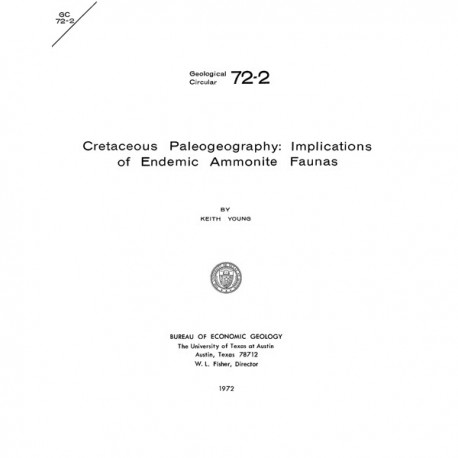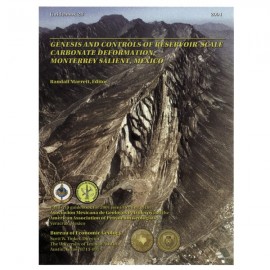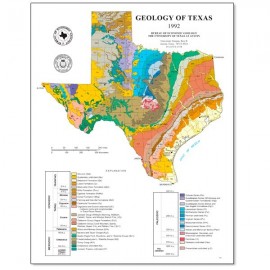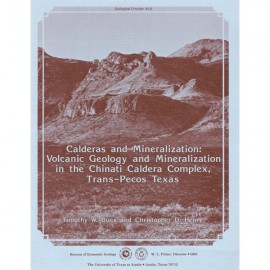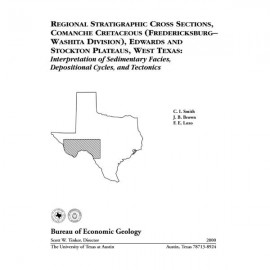Geological Circulars
-
Books & Reports
- Reports of Investigations
- Guidebooks
- Udden Series
- Geological Circulars
- Down To Earth
- Atlases of Major Oil and Gas Reservoirs
- Texas Memorial Museum Publications
- Environmental Geologic Atlas of the Texas Coastal Zone
- Mineral Resource Circulars
- Other Reports
- Seminars and Workshops
- Handbooks
- Submerged Lands of Texas
- Symposia
- Annual Reports
- Open File Reports
-
Maps & Cross Sections
- Thematic Maps
- Miscellaneous Maps, Charts & Sections
- Geologic Atlas of Texas
- STATEMAP Project Maps
- Geologic Quadrangle Maps
- Cross Sections
- Highway Geology Map
- Energy and Mineral Resource Maps
- Shoreline Change and Other Posters
- Wilcox Group, East Texas, Geological / Hydrological Folios
- Bouguer Gravity Atlas of Texas
- River Basin Regional Studies
- Featured Maps
- Posters
- Teachers & the Public
-
Geological Society Publications
- Gulf Coast Association of Geological Societies
- Alabama Geological Society
- Austin Geological Society
- Corpus Christi Geological Society
- Houston Geological Society
- Lafayette Geological Society
- Mississippi Geological Society
- New Orleans Geological Society
- South Texas Geological Society
- GCS SEPM Publications
- Historic BEG & UT Series
Cretaceous Paleogeography: Implications of Endemic Ammonite Faunas
GC7202
A free, digital version of this publication can be found on: Texas ScholarWorks
GC7202. Cretaceous Paleogeography: Implications of Endemic Ammonite Faunas, by K. P. Young. 13 p., 4 figs., 3 tables, 1972. ISSN: 2475-3637.
To purchase this publication as a PDF download, please order GC7202D.
ABSTRACT
Endemic ammonite faunas evolved from cosmopolitan faunas in a series of successive episodes over about 35 million years of the Cretaceous of the Gulf Coast of the United States. During basin-basin-margin tectonic adjustments the Cretaceous barrier reef was inundated or circumvented so that a cosmopolitan fauna entered the back-reef area. Gradual isolation of the fauna behind the barrier produced endemism. With the next basin adjustment the endemic fauna became extinct, and a new cosmopolitan fauna migrated into the back-reef area, likewise evolving into an endemic fauna in its turn. Six cosmopolitan-endemic cycles have been identified. Geological evidence suggests two or three additional cycles.
Keywords: Cretaceous, ammonites, faunas, Gulf Coast, Texas
CONTENTS
Abstract
Introduction
Paleogeographic setting
Cosmopolitan-endemic cycles of the Comanchean
Trinity faunas
Fredericksburg cycle
Washita endemic faunas
Low generic diversity-a key to endemism
Relation of endemism to depositional cycles
Endemism and correlation
Conclusions
Acknowledgments
References
Figures
1. The Comanchean Shelf behind the barrier reef
2. Block diagram illustrating the back-reef topography for a part of Texas during the Middle Albian
3. Paleogeographic features of Texas during much of the Comanchean
4. Diagrammatic representation of rocks containing endemic and cosmopolitan faunas
Tables
1. Correlation of Comanchean sections for areas from which formations are mentioned in text
2. Alternation of endemic and cosmopolitan zones on the Texas Comanche Shelf
3. Correlation with European zones
Citation
Young, K. P., 1972, Cretaceous Paleogeography: Implications of Endemic Ammonite Faunas: The Universijty of Texas at Austin, Bureau of Economic Geology, Geological Circular 72-2, 13 p.
